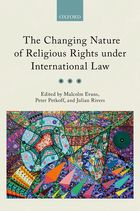Changing Nature of Religious Rights under International Law

Changing Nature of Religious Rights under International Law
Malcolm Evans, Peter Petkoff, and Julian Rivers
Oxford University Press 2015
- Provides a comprehensive and in-depth understanding of the controversial human right to freedom of religion or belief under international law
- Evaluates the different components of this right, drawing on the 1981 UN Declaration on the Elimination of Discrimination Based on Religion or Belief and other relevant sources
- Offers an in-depth analysis of specific issues like religious conversions, religious hatred, and the policies of the European Union and the Organisation for Security and Co-operation in Europe
The Declaration on the Elimination of All Forms of Intolerance and of Discrimination Based on Religion or Belief, as proclaimed by the United Nations General Assembly in 1981, is the only universal human rights instrument specifically focusing on religious intolerance and discrimination. However, recent years have seen increasing controversy surrounding this right, in both political and legal contexts. The European Court of Human Rights has experienced a vast expansion in the number of cases it has had brought before it concerning religious freedom, and politically the boundaries of the right have been much disputed. This book provides a systematic analysis of the different approaches to religious rights which exist in public international law.
The book explores how particular institutional perspectives emerge in the context of these differing approaches. It examines, and challenges, these institutional perspectives. It identifies new directions for approaching religious rights through international law by examining existing legal tools, and assesses their achievements and shortcomings. It studies religious organisations’ support for international human rights protection, as well as religious critique of international human rights and the development of an alternative religious ‘Bills of Rights’. It investigates whether expressions of members belonging to religious minorities can be considered under the minority right to culture, rather than the right to religion, and discusses the benefits and shortcomings of such a route. It analyses the reach and limits of the provisions in the 1981 Declaration, identifies ways in which the right is being eroded as a concept, and suggests new ways in which the right can be reinforced and protected.
Readership: Scholars and students of law and religion, and international human rights
Edited by Malcolm Evans, OBE, Professor of Public International Law, University of Bristol, member of the Organisation on Security and Cooperation in Europe’s Advisory Council on Freedom of Religion and Belief, and the author of many publications on international law, human rights, and religion; Peter Petkoff, Fellow of the Centre for Christianity and Culture, Regent’s Park College, Oxford; and Julian Rivers, Professor of Jurisprudence, University of Bristol; Foreword by Baroness Berridge of the Vale of Catmose
Contributors:
Ilias Bantekas (Brunel University)
Heiner Bielefeldt (Erlangen Nuremberg University and UN Special Rapporteur on Freedom of Religion or Belief)
Cole Durham (Brigham Young University)
Nazila Ghanea (University of Oxford)
Thomas Krapf (formerly an OSCE Advisor on Freedom of Religion or Belief)
Natan Lerner (Tel Aviv University)
Christopher McCrudden (Queen Mary University Belfast and University of Oxford)
Knox Thames (US Commission of International Religious Freedom)
Michael Wiener (United Nations)
Alexandra Xanthaki (Brunel University)